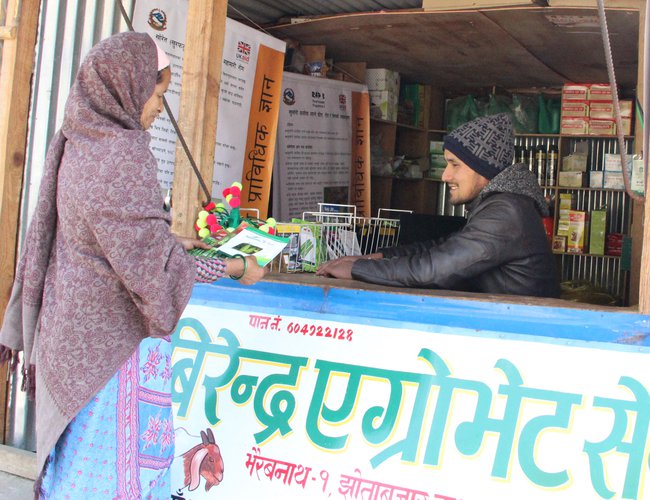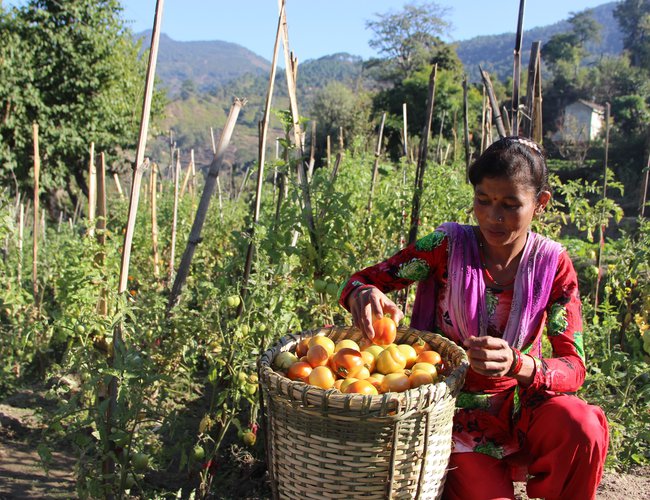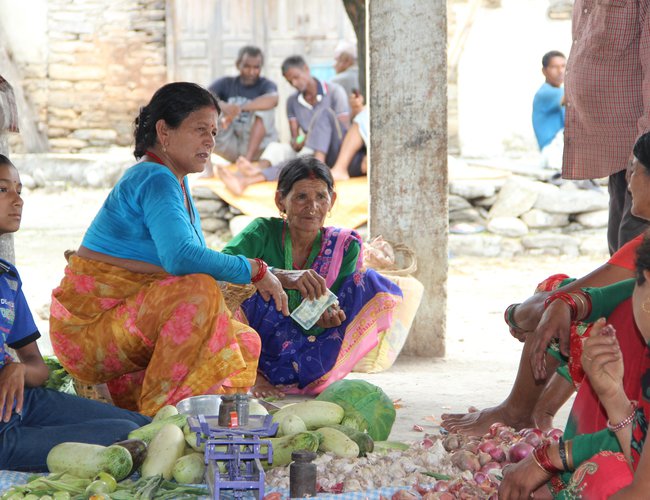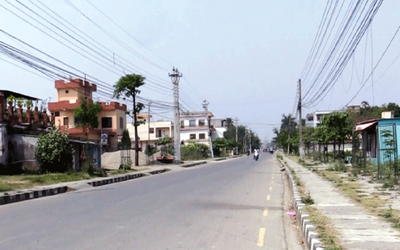
When POSANFS was implemented in four acute food deficit districts of far western region, namely, Bajhang, Doti, Achham and Bajura three years ago, the food security status of the region was alarming. Focusing on over 7500 households, of poor and marginalized people, the project has been able to bring drastic changes in their lives.
From being completely food deficit, the people are now becoming food sufficient and have market access. With a subsistence-based agriculture, their farm production was not enough to feed the family, so the people used to go to India for work to earn money and buy the food.
As POSAN Food Security project has come to an end, the same people have moved from their subsistence level to commercialized farms producing enough food to feed the family and sell the surplus in the local market.
Experts, project staffs and local beneficiaries shared their views in a learning-sharing workshop about how the project has changed the livelihood in the four districts, following the completion of the project.
Funded by European Union, the project is the first of its kind, which addresses food and nutrition security through the commercialization of goat, vegetable and spice sub-sectors. The project also helps improve the knowledge on food utilization and easy access to diverse food resources for women, children and vulnerable groups, while creating and sustaining agri-enterprise for sustained livelihood.
Accham’s Experience
For the people of rural Achham, they hardly knew that the agriculture and other fresh farm products had market value. With the implementation of the project, which opened a market in Sanphegbar, things changed. Started in 2015, the local weekly market has now seen a booming trade with local products.
As the people carried the goods from far flung areas, the Sanphebagar is filled with fresh farm produces. With support from POSAN Food Security project and in coordination with local governing bodies, political parties and civil society organizations, more than 20 women are involved in the haat bazaar and the total turnover of the market in the last 12 months was above NPR 434,000 (£ 3380).
Tanka Mahat of Nawathana, who regularly sells her products at the haat bazaar, shares, “Despite having a small production, I am being habituated to an enterprise culture. It’s better than roaming around shouldering heavy load of vegetables.”
The haat bazaar has also offered locals a chance to buy a variety of fresh agro-products, and linked farmers with wholesalers, spice processors and larger grocery firms. Through this approach, POSAN FS project has connected the local farmers with market and helped them sustain their livelihood by strengthening the agriculture value chain.
The tale of Govinda Khadka, 47, of Gajra village in Achham is different. Resigning as a primary school teacher in 2014, due to the low remuneration and instability, Khadka, a former migrant worker with experience of work in India, was frustrated as his income never paid enough for his family of five, including his wife and three sons.
Having three ropanis of land and two sons working in India, Khadka and his wife always had difficulty to feed themselves. As Khadka was considering migrating to India for work, POSAN came to his rescue. Following a 35-day agro-vet training, he started his own business opening an agro-vet shop with a financial assistance of Rs.25, 000.00 (US$ 250).
As Khadka started his agro-vet business, it gave a sigh of relief to the people, who otherwise had to go far away to get this kind of service. For Khadka, this was a good employment opportunity back home.
“As a barefoot agro-vet, I am able to make above NPR 40,000 (£ 310) annually. This is a lot of money for me. I have been saving most of the income for my retirement and possible medical expenses for me and my wife in future. However, it is not just about money, I get to socialize in every nook and cranny of this village and sometimes even beyond. People regard me for my service which means a lot to me. I imagine, only if I was not given this opportunity, I would not be leading such a respectful life,” said Khadka.
This is one among many approaches POSAN introduced to strengthen food and nutrition security of the region including agriculture commercialization and reduce the migration.
After three years of rigorously working together with the beneficiaries, development partners and government bodies, 7,500 households like that of Khadka have seen the benefits.
With the completion of the project, Practical Action held a workshop to share evidence and knowledge from the ground experience to contribute to strengthen food and nutrition security and for overall agriculture development of Nepal.
Co-funded by the European Union and partnered by SEBAC Nepal and Saipal Development Society, the overall project budget was € 9, 26,000. The European Union had funded 75 per cent of the total budget while Practical Action had contributed remaining 25 per cent.
“Far western and mid-western regions have been facing acute food shortages. As there is no market access, the agriculture is subsistence based. The project has shown that access to market and commercialization is key to change,” said Dila Ram Bhandari, Director General, Department of Agriculture and the Chief Guest of the program. The department is highly appreciative of the project for improving livelihood opportunities of the people through market value chain strengthening and increasing people’s nutritional and food security situation.”
According to the government report, food and nutrition are major issues of the region. The study made by Central Bureau of Statistics reveals that children of far western region are facing the problems related to nutrition. As agriculture is not enough to sustain the family for even six months, people are migrating to India for work.
“Practical Action is thankful for the work in the region where food and nutrition is the major issue. The approach of POSAN Food Security is practical as the project has applied programs in market strengthening, goat resource centers, School Led Nutrition System (SLNS), Climate Field Scholl and promotion of neglected and nutritious crops are very appropriate and useful in the region,” said Bhandari.
Supporting Nepal to address nutrition and food security, Rensje Teerink, the Head of Delegation of the European Union, also expressed that EU was pleased to have supported this project and said, “the project has clearly made a difference in the lives of small farmers in remote areas of the country.”
Although the project period was short, it has injected the ideas in the mind of the people that the time has come to change the subsistence based agriculture to generate employment as well as produce adequate food.
With the introduction of drip and sprinkler irrigation, the farmers have started off season vegetables along with traditional crop like wheat. "We planted cucumber and Zucchni in our land in the sideline of wheat. We benefited more than five times the income from wheat,” said Kala Devi Kunwar. "We would probably fall prey to starvation due to minimal wheat production caused by last year’s long standing drought. Indeed, that was our good initiation against the situation we have been facing since very long.”
Linking the farmers to the market, the project helped to integrate the agriculture products in entire value chain. For the poor farmers, commercialization of agriculture is important to improve the livelihood.
“The project has done a lot in improving income and food and nutrition security of more than 7,500 households in the project regions,” said Robert Hynderick de Theulegoet, Attaché – Rural development, European Union. “We want to congratulate the Practical Action for successfully implementing the program.”
“The Commercialization of three subsectors, goat, vegetables and spice help to improve the food security and nutrition of women and children,” said Dr. Sujan Piya, head of Agriculture, Food Security and Market of Practical Action. “We are successful because these three areas are key areas in the region to bring the change.”
Assessing the food security situation of the four districts, Dr. Rishi Adhikhari, who worked to develop a Food Security Strategy, presented findings of food security strategy development in the four districts of far-west Nepal.
Practical Action facilitated to develop the district food security strategy paper in all four project districts. The aim of food security strategy paper is to assess the local food security situation and propose the strategies and opportunities to achieve food security.
“This program can be replicated in many other food deficit districts of far west and mid-west,” said Banshi Sharma, joint secretary of the Ministry of Livestock. Women are the key to bring change in agriculture; the project has formed several women groups training them how to link the market. “This program also empowers women working in the agriculture sector. Without active participation of the women, nothing is possible,” said Sabnam Shivakoti, joint secretary Ministry of Agriculture and Development.
This project includes several important components of food security. This project helps to address food and nutrition security through commercialization of goat vegetables and spice sub sectors, improving knowledge on food utilization and easy access to diverse food resources for women, children and vulnerable groups and creating and sustaining agri-enterprises for sustained livelihood,” said Achyut Luitel, Regional Director, Practical Action.




Keshab Poudel
Poudel is the editor of New Spotlight Magazine.
- IWMI: SoLAR Global Science-Policy Forum Conference
- Apr 25, 2024
- CLA: Samriddhi For Skill Development
- Apr 23, 2024
- ECONOMY: Growth At 3.3
- Apr 16, 2024
- DPM’s SHRESTHA’S CHINA VISIT High Profile, Low Key
- Apr 14, 2024
- Maha Kumbha In Barahkshetra: A Sacred Festival In Sacred Koshi (Kaushiki) River
- Apr 09, 2024
















